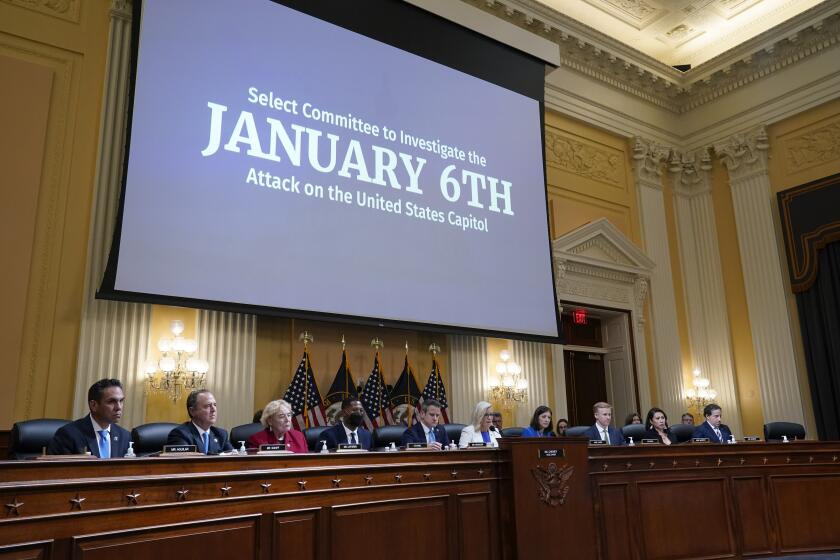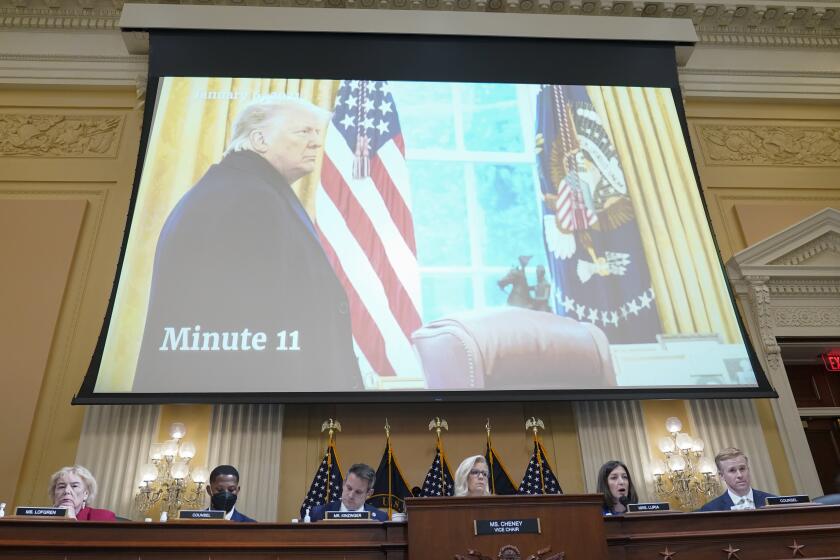Bannon convicted of contempt for defying Jan. 6 subpoena

The Trump ally has been convicted of contempt charges for defying a subpoena from the House committee investigating the Jan. 6 insurrection.
- Share via
WASHINGTON — Stephen K. Bannon, a longtime ally of former President Trump, was convicted Friday of contempt charges for defying a congressional subpoena from the House committee investigating the Jan. 6 insurrection at the U.S. Capitol.
Bannon, 68, was convicted after a four-day trial in federal court in Washington on two counts: one for refusing to appear for a deposition and the other for refusing to provide documents in response to the committee’s subpoena. The jury of eight men and four women deliberated for just under three hours.
Bannon could get up to two years in federal prison at his sentencing on Oct. 21. Each count carries a minimum sentence of 30 days in jail.
As Trump watched the Capitol siege on TV, members of Pence’s security detail feared for their lives, the panel says in its last televised hearing until September.
The committee sought Bannon’s testimony over his involvement in Trump’s efforts to overturn the 2020 presidential election.
Bannon had initially argued that his testimony was protected by Trump’s claim of executive privilege. But the House panel and the Justice Department challenged that because Trump had fired Bannon from the White House in 2017, so Bannon was a private citizen when he consulted with the then-president ahead of the Capitol siege on Jan. 6, 2021.
Bannon’s lawyers argued during the trial that he didn’t refuse to cooperate and that the dates “were in flux.” They pointed to the fact that after Trump waived his objection shortly before the trial kicked off, Bannon reversed course and offered to testify before the committee.
In closing arguments Friday morning, both sides reemphasized their positions. Prosecutors maintained that Bannon had willfully ignored clear and explicit deadlines, and the defense said Bannon believed those deadlines were flexible and subject to negotiation.
“For 187 minutes on January 6, [2021], this man of unbridled destructive energy could not be moved,” Chairman Bennie Thompson (D-Miss) said at the start of the hearing.
Bannon was served with a subpoena Sept. 23 last year ordering him to provide certain documents to the committee by Oct. 7 and appear in person by Oct. 14. He was indicted in November on two counts of criminal contempt of Congress, a month after the Justice Department received the House panel’s referral.
Bannon’s attorney Evan Corcoran told jurors in closing arguments that those deadlines were mere “placeholders” while lawyers on each side negotiated terms.
Corcoran said the committee “rushed to judgment” because it “wanted to make an example of Steve Bannon.”
Corcoran also hinted that the government’s main witness, Jan. 6 committee chief counsel Kristin Amerling, was personally biased. Amerling admitted on the stand that she is a lifelong Democrat and had been friends with one of the prosecutors for years.
Corcoran also suggested that the signature of committee Chair Bennie Thompson (D-Miss.) looked different on the subpoena than on other letters, but dropped that topic when the prosecution objected.
Prosecutors focused on a series of letters exchanged between the Jan. 6 panel and Bannon’s lawyers. The correspondence shows Thompson immediately dismissing Bannon’s assertion that he was exempted by Trump’s claim of executive privilege, and explicitly threatening Bannon with criminal prosecution.
“The defense wants to make this hard, difficult and confusing,” Assistant U.S. Atty. Amanda Vaughn said in her closing statement. “This is not difficult. This is not hard. There were only two witnesses because it’s as simple as it seems.”
A series of congressional hearings about the Jan. 6, 2021, attack on the U.S. Capitol have been televised. Here’s what you need to know.
The defense had motioned for an acquittal on Thursday, saying the prosecution had not proved its case. In making the motion before U.S. District Judge Carl Nichols, Corcoran said that “no reasonable juror could conclude that Mr. Bannon refused to comply.”
Once the motion was made, the defense rested its case without putting on any witnesses, telling Nichols that Bannon saw no point in testifying since the judge’s previous rulings had gutted his planned avenues of defense.
Among other things, Bannon’s team was barred from calling House Speaker Nancy Pelosi (D-San Francisco) or members of the House panel as witnesses.
Defense lawyer David Schoen said Bannon “understands that he would be barred from telling the true facts.”
More to Read
Get the L.A. Times Politics newsletter
Deeply reported insights into legislation, politics and policy from Sacramento, Washington and beyond. In your inbox twice per week.
You may occasionally receive promotional content from the Los Angeles Times.












